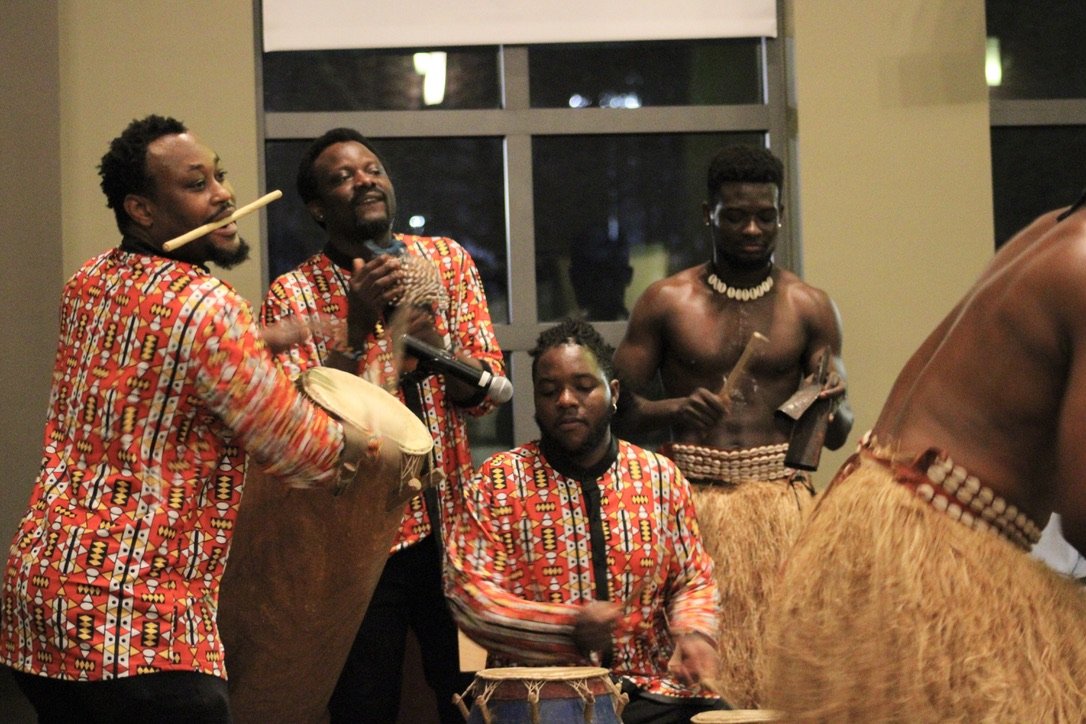Students Learn Ghanaian Drumming and Dancing
Traditional Ghanaian Music with Nii Okai Aryeetey and Omanye Music and Dance Ensemble. Credit: Ava Battinelli ‘26
As part of a continued celebration of Black History Month, Marist hosted a Ghanaian drumming workshop on Feb. 21. The event, which took place in the Cabaret lounge, invited Nii Okai Aryeetey and the Omanye Music and Dance Ensemble to teach students how to play Kplango, a traditional Ghanaian drum.
The workshop began with rudimentary instructions, such as how to prop the drum against the knees and how to hit it. By the end, the students were able to incorporate multiple rhythms interchangeably underneath the melodies, vocal and percussive, of Omanye.
Having attended the dance workshop hosted earlier in the day by the same group, Emily Garcia ‘27 expressed her enjoyment of both events and appreciated that the members of Omanye welcomed and accepted those who wanted to learn more about Ghanaian culture.
Lily Schettino ‘27 attended the workshop because of her first year seminar class, “Africa is not a country,” and said the experience opened her horizons. She admitted that she wasn’t very aware of cultures outside her own before the event, but that did not detract from her enjoyment of the occasion.
“It made me so happy seeing [the performers] so happy,” said Schettino.
After learning the basics, Aryeetey, who hails from Accra, Ghana, and has a decade of experience on Kplango teaching drum lessons there, gradually turned things up by introducing more and more complex rhythms and eventually adding call-and-response elements like chants, rhythm-switching and singing.
At one point, Aryeetey asked each student to individually perform the first couple of rhythms in the call-and-response format. Aryeetey was beyond excited to educate and overjoyed when the group could play back the rhythms as he’d laid out.
The event concluded with an extended jam session, as the members of Omanye freely sang out over the prolonged drumline. It was at this point that multiple students really got into the swing of things, and Aryeetey played off of their passion perfectly by momentarily relinquishing the drum and dancing freely amongst the instruments, which had been laid out in a circle.
The following day, Aryeetey and the Ensemble hosted a performance of traditional Ghanaian music for all to attend. They were joined by Dr. Gavin Webb, dean of international programs and assistant professor of music, who helped put together the workshops.
Marist faculty and staff were just as passionate as the students about the event and what it provided to the attendees.
“It’s important to help students not only hear about a culture but actually live it,” said Iris Ruiz-Grech, director of the Center of Multicultural Affairs.
The Center of Multicultural Affairs, which sponsored the event, aims to aid students in the transition to college while facilitating culturally-focused events on the Marist campus.
Ruiz-Grech added that being able to actually do the drumming event – rather than just hear about it – gives students the chance to feel, hear and experience diversity rather than just know about it.
“Cultural events, such as the recent Ghanaian drumming event, play a pivotal role in enriching the campus environment at Marist,” said Dr. Edward Antonio, the vice president of diversity, equity and inclusion at Marist. “They serve as a vibrant platform for students to engage with and learn about diverse cultures, to foster a deeper understanding and appreciation of the world's rich tapestry of traditions and perspectives.”
The Office of Diversity, Equity and Inclusion is responsible for the DEI Bulletin, DEI Express and other publications to keep Marist students informed. The DEI office, according to Antonio, is committed to keeping diverse events – including the Ghana drumming event – and resources accessible to students.
“The Center for Multicultural Affairs, the Office of DEI and academic schools underscore our commitment to a holistic and inclusive approach to DEI,” said Antonio.
Among dining hall events, posters and other events around campus, Marist’s efforts to celebrate Black History Month have brought students and faculty together to celebrate diversity and inclusion in the Marist community. Future diversity events on campus include Diversity Day on April 24, a social justice conference in the fall of 2024 and more under the “Expansive Community” value of the Marist 100.
“By recognizing and celebrating different cultures, we encourage inclusivity and dialogue, essential elements for a vibrant, cohesive community,” said Antonio.
